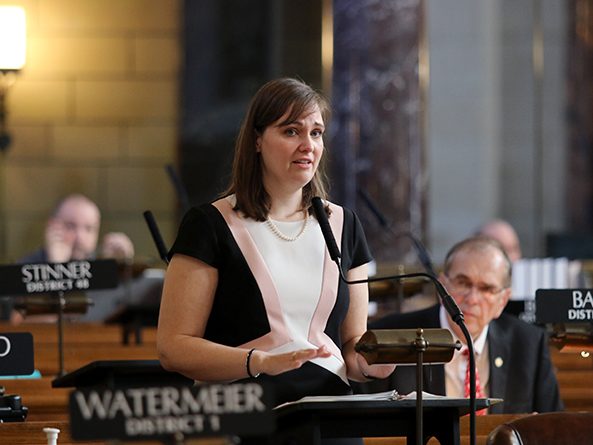Tighter controls on opiate prescriptions advanced
Lawmakers gave first-round approval to a bill Feb. 26 that would tighten restrictions on dispensing opiates in Nebraska.

LB931, sponsored by Omaha Sen. Sara Howard, would limit opiate prescriptions for a patient younger than 19 to no more than a seven-day supply. A medical practitioner would be required to discuss the risks associated with opiates with the patient’s parent or guardian. Exceptions to the seven-day limitation could be made for chronic pain, cancer diagnosis or palliative care.
If a health practitioner deems such an exception appropriate for a patient, he or she would be required to document the medical condition requiring the pain medication in a patient’s medical record and indicate that a non-opiate alternative was not appropriate to address the condition.
Howard said her sister Carrie, who developed an addiction to prescription pain medication and died of an overdose in 2009, was her inspiration for bringing legislation to combat the state’s opioid problem.
The Legislature has collectively changed the face of the opioid addiction in Nebraska, Howard said, with its passage of a prescription drug monitoring program. She said an article from the Pew Charitable Trust ranks Nebraska as just one of 14 states that saw a decline in the rates of opioid addition and deaths in the country.
“We wouldn’t give narcotic medications to a child for more than a week, but there are some physicians who are giving a month’s worth just to be on the ‘safe side,’” Howard said of LB931. “This [bill] shifts the focus to the doctor’s office and at the pharmacy—having that important conversation before they send out that medication with minors.”
A Judiciary Committee amendment, adopted 38-0, limited the bill’s provisions to patients younger than 18 to accommodate young people who may be living independently. The amended bill would expire on Jan. 1, 2029, to allow lawmakers to revisit the need for continuation of the program.
The amendment also incorporated into LB931 provisions of two additional bills addressing opiate prescriptions.
LB933, introduced by Omaha Sen. Brett Lindstrom, would require medical practitioners to notify patients—or a parent or guardian of a patient under 18—of the risk of addiction and overdose when prescribing opiates and other Schedule II prescription medications. The notification would be required prior to the initial prescription and again before issuing a third prescription.
Under the bill, a practitioner would be required to discuss the risks of addiction and overdose, including:
• the fact that controlled substances and opiates are highly addictive even when taken as prescribed;
• there is a risk of developing a physical or psychological dependence on opiates or controlled substances;
• reasons why the prescription is necessary and alternatives that may be available; and
• taking more controlled substances or opiates than prescribed, or mixing sedatives, benzodiazepines or alcohol with controlled substances or opiates, can result in fatal respiratory depression.
A notation in the patient’s medical record of the discussion would be required.
LB934, introduced by Heartwell Sen. John Kuehn, would require a person picking up an opiate prescription to provide valid photo identification. A driver license, operator license, Nebraska state identification card, military identification card, alien registration card or passport would be considered acceptable forms of identification.
A patient, resident or employee of a licensed health care facility would be exempt from this provision if identification procedures are in place for the receipt and administration of controlled substances at the facility.
Kuehn said his bill mirrored successful legislation passed to address the inappropriate distribution of Sudafed, which can be used in the production of methamphetamine. To adequately address the opioid epidemic, he said, we must start with the primary suppliers.
“Opioid addiction, for the most part, begins with a prescription pad, a pen and a health care provider,” Kuehn said. “If we are really going to get to the root cause of why people are getting addicted to prescription painkillers and dying, we have to start talking about what’s happening in the exam room.”
Omaha Sen. Bob Krist supported the bill, saying that Nebraska needs to take proactive steps to stop the spread of addiction.
“The opioid epidemic may not be as violent or as oppressive as it is on the East coast, but it is moving this way,” he said.
Senators advanced the bill to select file on a 47-0 vote.


